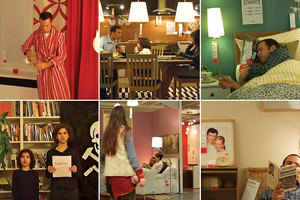This is an archive of the ArtCat Zine, 2007-2009. Please visit our new project, IDIOM.
Guy Ben-Ner at Guggenheim
Are spaces and places of consumption actually laden with significance? Or are they simply the last shared experience we have left to talk about? (and is that all that makes them significant?) Despite being one of the most consistent tropes of our inherited critical landscape, it is sometimes hard to dinstinguish the gesture towards consumption - the passing or even sustained acknowledgment of its prominence is what passes for public life - from its critque. When the culture industry displays even the slightest hint of self-consciouness, by setting a zombie movie in a mall, say, everyone trips over each other proving what a cheap critical date they are; tittering on and on in an embarassing state of metaphoria.
The flip side is those rare occassions when certain brands actually do cross over from the background noise of advertising into something approaching cultural significance, a moment marked by their appearance in conversation alongside media personalities, tv shows, and anything else whose personal space they would typcially have to pay to share. IKEA is such a cross-over phenomenon, straddling the line between shopping and lived experience just a little more convincingly than its competitors. Its strangely cheap. Its tinged with a foregin exoticism. It has food. It is also, for a certain segment of the population, a nearly universal pilgramage. No doubt it is this rare appearence of somthing like universalism that Guy Ben-Ner targets in his video work, Stealing Beauty installing himself and his family in a series of IKEAs throughout the world, attempting to wring comedy from the juxtaposition of a real familiy in a fabricated place. Ben-Ner will discuss this, and other work, tommorow at the Guggenheim.
ZINE
HOME
TIPS / COMMENTS
CATEGORIES
CONTRIBUTORS
- Greg Afinogenov
- B. Blagojevic
- Adda Birnir
- Susannah Edelbaum
- Julie Fishkin
- Paddy Johnson
- Jessica Loudis
- Christopher Reiger
- Andrew Robinson
- Peter J. Russo
- Blythe Sheldon
- S.C.Squibb
- Hrag Vartanian

